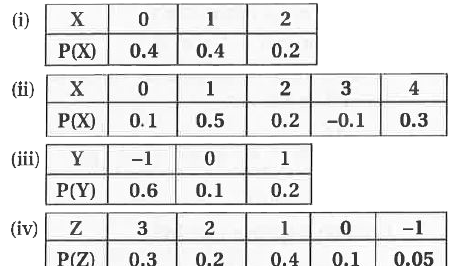Given two independent events A and B such that P(A) = 0.3, Find
(i) P(A and B) (ii) P(A and not B)
(iii) P(A or B) (iv) P(neither A nor B)Solution in Gujrati
The correct Answer is:0.12
Step by step video, text & image solution for Given two independent events A and B such that P(A) = 0.3, Find (i) P(A and B) (ii) P(A and not B) (iii) P(A or B) (iv) P(neither A nor B) by Maths experts to help you in doubts & scoring excellent marks in Class 12 exams.
Updated on:21/07/2023Topper's Solved these Questions
- PROBABILITYBook:KUMAR PRAKASHANChapter:PROBABILITYExercise:EXERCISE -13.3
Explore 14 Videos
- PROBABILITYBook:KUMAR PRAKASHANChapter:PROBABILITYExercise:EXERCISE -13.4
Explore 20 Videos
- PROBABILITYBook:KUMAR PRAKASHANChapter:PROBABILITYExercise:EXERCISE -13.1
Explore 23 Videos
- MATRICES Book:KUMAR PRAKASHANChapter:MATRICES Exercise:Practice Paper - 3 (Section - D)
Explore 1 Video
- RELATIONS AND FUNCTIONS Book:KUMAR PRAKASHANChapter:RELATIONS AND FUNCTIONS Exercise:Practice Paper - 1 (Section - D)
Explore 2 Videos
Similar Questions
An urn contains 5 red and 5 black balls. A ball is drawn at random, its colour is noted and is returned to the urn. Moreover, 2 additional balls of the colour drawn are put in the urn and then a ball is drawn at random. What is the probability that the second ball is red?
View SolutionState which of the following are not the probability distributions of a random variable. Give reasons for your answer.

View SolutionGiven that E and F are events such that P(E)=0.6,P(F)=0.3and(E∩F)=0.2, find P(E|F) and P(F|E)
View SolutionFor matrix A=⎡⎢⎣11112−32−13⎤⎥⎦ . Prove that , A3−6A2+5A+11I=0. Hence find A−1 using it .
View SolutionLet : f:N→N be defined by f(n)={n+12 if n is oddn2 if n is even for all n∈N .
State whether the function f is bijective . Justify your answer.
View SolutionGiven two independent events A and B such thatP(A)=0.3,P(B)=0.6. Find
(i) P(A and B)
(ii) P(A and not B)
(iii) P(A or B)
(iv) P(neither A nor B)
View SolutionIf A and B are two independent events and P(A)=0.2,P(B)=0.3, then find the values of the following:
(i) P (A and B) (ii) P (A and not B)
(iii) P (A or B) (iv) P (none of A and B)
View SolutionA और B स्वतंत्र घटनाएं दी गई है जहां P(A)=0.3,P(B)=0.6 तो
(i) P(A and B) (ii) P (A और B-नहीं)
(iii) P (A या B) (iv) P(A और B में कोई भी नहीं) का मान ज्ञात कीजिए।
View Solution(a) Given two independent events A, B such that P(A)=0.3,P(B)=0.6. Find :
(i) P (A and B)
(ii) P (A and not B)
(iii) P (A or B)
(iv) P (neither A nor B).
(b) If P(A)=0.2,P(A∪B)=0.6, find P (B).
View SolutionGiven two independent events A and B such that P(A) = 0.3, P(B) = 0.6. Find i. P(A and B) ii. P(A and not B)
iii. P(A or B) iv. P( neither A nor B)
View SolutionLet A and B be independent events with P(A) = 0.3 and P(B) = 0.4. Find
(i) P(A∩B) (ii) P(A∪B)
(iii) P(A|B) (iv) P(B|A)
View SolutionGiven two independent events A and B such that P(A) = 0.3 P(B) = 0.6 , Find
(i) P(A and B) (ii) P(A and not B)
(iii) P(A or B) (iv) P(neither A nor B)
View SolutionLet A and B be independent events with P(A) = 0.3 and P(B) = 0.4. Find
(i) P(A∩B) (ii) P(A∪B)
(iii) P(A|B) (iv) P(B|A)
View SolutionGiven two independent events A and B such that P(A) = 0.3, Find
(i) P(A and B) (ii) P(A and not B)
(iii) P(A or B) (iv) P(neither A nor B)
View SolutionLet A and B be independent events with P(A) = 0 . 3 and P(B) = 0 . 4, . Find
P(A∩B)
View SolutionLet A and B be independent events with P(A) = 0.3 and P(B) = 0.4. Find
(i) P(A∩B) (ii) P(A∪B)
(iii) P(A|B) (iv) P(B|A)
View Solution

